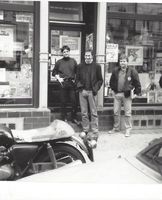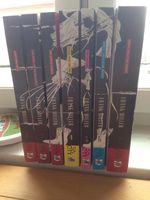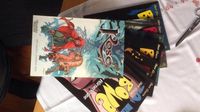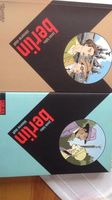Dispatches From Berlin
By Koom Kankesan
This is a departure for the series. Lutz Göllner lives in Berlin, Germany. We met online due to our mutual appreciation of Frank Miller's work. Lutz has met Miller and translated some of his writing in German. Towards the end of December, after the terror attack at the Berlin Christmas market, I thought it would be useful to interview Lutz about his thoughts on the incident. I am not an overtly political writer, and I don't necessarily agree with Lutz's politics, but I thought that since the opportunity presented itself, it was better to avail myself out of curiousity than bury my head in the sand. And then, as I was preparing the interviews for this series, the attack happened at the nightclub in Turkey and the decision to post this was sealed.
The above photo is of Lutz (right) and Frank Miller (centre) from the time Miller visited Germany. The photos below are of American comics that Lutz has had a hand in translating.
Koom: Tell us a little bit about yourself as a writer, your interests. What made you become a writer? What topics did you follow?
Lutz: Ha ha, that's easy to answer! Alan J. Pakula's film All The President's Men! I wanted to ride a car like Bob Woodward (a Carmen Ghia) but I rode a bicycle like Bernstein (a Raleigh). It was another time. These writers did not want to make politics - they wanted to write about politics. They changed everything. Another big influence: I've always loved Ben Hecht's play His Girl Friday, and I adore every movie version of this play.
Koom: That's great. So did you go to journalism school and dive into writing about politics? Or was it more of a roundabout path?
Lutz: I come from a working class background and the life of a journalist seemed glamorous to me. Germany in the late 60's, early 70's, was a dark place for a child to live in, West-Berlin especially. My teacher asked me what I wanted to be. I answered "I want to study and became a journalist." And she told me "Lutz, you are the son of a working man, you can't study!" I was shocked! So, in a way, my "career" is my revenge on her. I studied the German language, literature, and politics at the Freie Universität Berlin. I studied for a long time, a very long time. I sold small articles to Berlin newspapers and magazines in West Germany. One day, an editor said to me: "Break off your studies, this will not work out anyway, and do an internship." That was 30 years ago.
I wrote about everything. Beggars can't be choosers. In the late 80's, I wrote about windhund races in the Gatowheide, the Radiolandschaft in West Berlin, about a strike by garbage men, but also books of criticism. My Volontariat was mostly concerned with German education policy. This allowed me to become independent in the early 1990's. I founded a journalist office and worked as a freelancer for 15 years, mostly on education policy. Since my hobby was also always literature - especially comics - I wrote a lot about these subjects at this time. I do not want to beat my own chest, but in time I became a successful specialized journalist.
Your CanLit News
Subscribe to Open Book’s newsletter to get local book events, literary content, writing tips, and more in your inbox
Koom: You've told me that you're not a big fan of Angela Merkel?
Lutz: Merkel ... I'm not a supporter of her party. But what she did in summer 2015 - open the border for refugees - was morally just and right, if not entirely politically legal! Did you hear the British radio journalist who said: everything the Muslims hear - from all sides, whether it is from ISIS, Erdogan, or their shitty dictators is: "The West Hates you!" And Merkel, by opening the borders, showed this was a lie. What Trump told the Americans, that everything is out of control in Germany, was a clear lie. However, the situation has become more dangerous during the last weeks. And that is our fault.
Koom: You're talking about allowing the conditions which caused the recent bombing of the Christmas market in Berlin?
Lutz: Correct! What we do know about the murderer: His name was Anis Amri, he is 24 years old, born in Tunisia. He came to Europe seven years ago, long before the refugee crisis. He was a well-known drug criminal back in Tunisia. His first stop in Europe was Italy, where he was imprisoned for theft and drug trafficking. when the Italians let him out in 2015, they tried to send him back to Tunisia, which didn't work. So he came to Germany, in the shadow of the hundreds of thousands of refugees who came at the same time. He lived here for nine months as an illegal alien, using fourteen different identities, dates, and places of birth. When his identity became clear, Germany tried to send him back to Tunisia. He used every loophole the German law had.
Koom: What is it like to be a journalist writing about these things in the current climate? What challenges do you face? How do you deal with them?
Lutz: Phe-ew!, that's a difficult question ... You know, I don't work on the big subjects, but I try to break them down into local subjects. For example, we have a problem with drug traffickers in a very specific park in a particular district of the city. Most of them came from North Africa a few years ago. In this district of the city, there are many emigrants who came to Berlin in the 60's and 70's. They are extremely angry about the conditions in this park. I talked to an old Turk about this and he told me: How can we teach our children, our grandchildren, to respect Germany when they see the park? This old man was no extremist, he was no Turkish fascist or Erdogan-Fan. Just an old man, who lived in this town for more than 40 years. And I think he's absolutely right. I don't write about terror or refugees or big politics. Just about living together, not in a hippie way. Living together is an ongoing discussion, i.e. HOW to live together.
This is (in my opinion) what makes Germany stand out during the last few decades: a permanent discussion - often very long and very tiring and boring - about how we choose to live together. That's what I love about my country!
The views expressed in the Writer-in-Residence blogs are those held by the authors and do not necessarily reflect the views of Open Book.
Koom Kankesan was born in Sri Lanka. While his family lived abroad, the civil war in Sri Lanka broke out and this caused them to seek a new home. They eventually settled in Canada and have lived here since the late eighties. He has a background in English Literature and Film Studies. Koom contributed arts journalism to various publications before becoming a high school teacher in the Toronto District School Board. Since working as a teacher, he has taken semesters off now and again to work on his fiction. The Tamil Dream, his new book, is his most ambitious to date. It looks at the end of the civil war in Sri Lanka and how it affected Tamils here in Canada. Besides literature and film, Koom has deep interests in history and science, and an enduring love for comic books.
You can write to Koom throughout January at writer@open-book.ca.






